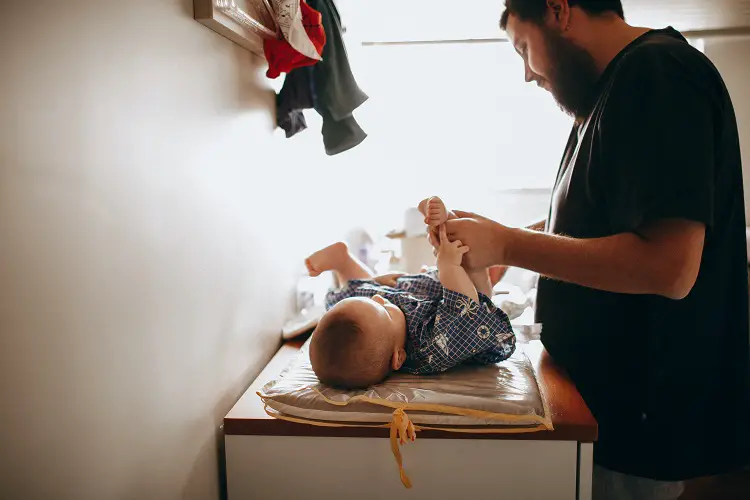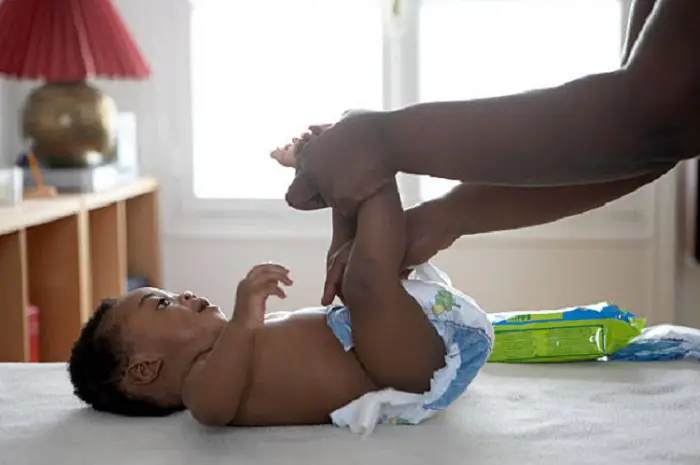Does your baby cry every time you change their diaper? Are you scared of having them changed publicly because they’ll cry hysterically?
Nothing is quite as exhausting and frustrating as a crying baby for new parents. Crying can signal a wet or poopy diaper.
Are you wondering why your baby cries when changing diaper and how to put an end to these diaper-changing battles? Keep reading
In this article, we will discuss various reasons that may prompt your baby to cry during a diaper change and what you can do to help your baby in the process.
Remember, for baby’s soiled diapers are the opposite of fun and it’s important to get to them as quickly as possible.
Table of Contents
- Reasons Why Your Baby Could Be Crying During Diaper Changes
- Are There Any Medical Related Concerns?
- Baby Cries When Changing Diaper? 15 Helpful Tips To Help You Cope
- Conclusion
Reasons Why Your Baby Could Be Crying During Diaper Changes

Babies are exploring a new world, and some things will influence them passionately. Don’t worry; most of these issues can be solved easily.
It’s a big world, so try and remind yourself that your baby is doing the best he/she can! Below are possible reasons your baby could be unexpectedly crying hysterically during their diaper changes.
- Cold: Babies, most especially newborns, hate the coldness during diaper changes.
- Hungry: When you decide to change before feeding, your baby may be too hungry to wait before being fed. Try changing after feeding the baby instead.
- Don’t Know What’s Going On: Most newborns simply dislike diaper changes because they don’t know what’s happening. After some time, as they get used to the diaper changing routine, the trust will build.
- Wants To Be In Charge Of Body And Time: As your baby gets older, they’ll want to be more in control of their body and time. They’ll dislike being swept away during play.
- Prevents Newfound Skills: Laying your baby on their back for a diaper change keeps them from exploring their newfound abilities (rolling, sitting up, crawling, etc.). Babies don’t like feeling restricted.
Are There Any Medical Related Concerns?
You can’t rule out any medical concerns. Some of these problems are only recognizable once your diapering newborn lay on its back.
Considering certain conditions are triggered in certain positions. Here is a description of a couple of medical conditions that affect newborn babies every year.
Spina Bifida And Acid Reflux
Babies that suffer from spina bifida have a congenital disability that causes their backbones to develop abnormally. This condition can cause spine and nerve damage, causing huge discomfort when babies lay on their backs.
Usually, in most circumstances, spina bifida is diagnosed during birth or before birth. However, it can be missed much of the time. If you think your baby is experiencing a type of spina bifida, have your doctor order an MRI or CT scan.
It’s unpleasant to babies that before they’ve gotten their start in the world, their stomach is already attacking them. Usually, with acid reflux in babies, they will hate lying down on their backs.
If your baby throws up, spits up, or cries rapidly during or after feedings, they may have acid reflux or gastroesophageal reflux disease known as GERD.
The discomfort is caused by the contents of the stomach returning to the esophagus, prompting turbulent pain.
Read Also: How To Get Poop Stain Out Of Changing Pad & Mat
Baby Cries When Changing Diaper? 15 Helpful Tips To Help You Cope

Diaper changes can be a daunting task, especially when your baby despises them. But they don’t need to cause uneasiness for you and your baby. Here are 15 ways to avoid the fighting and make diaper changes fun again:
1. Forewarn Your Baby
Will no one appreciate being swooped up and started doing stuff to you? Establish trust before you pick them up and place them on the table to avoid a power struggle.
Just make your presence known or visually maintain a sweet and calm presence. Communicate with him what you’re about to do every time. That way, he’ll know what to expect.
2. Put Your Baby On Their Back Throughout The Day
There might be the chance that your baby simply isn’t used to being put on their back like this consistently, leading to their distress and distrust.
Practice the movement by laying him throughout the day to play with you.
The nonstop development will gradually be instilled into him as normal and safe. Also, it will make it a positive encounter! Making the baby turn out to be more open and trusting.
3. Stay Efficient
By this, we additionally mean stay coordinated. Perhaps every time you proceed and change them it becomes a lengthy process because all the tools are all over the place.
Having your baby waiting and resting for a longer period has made the diaper changing process a frightening one.
Furthermore, you risk your baby tumbling off the table while you run about getting everything you need.
Try not to leave your baby alone on elevated surfaces. Don’t worry; simply get together what you need and keep it in an assigned spot!
4. Distract Your Baby
Toys are pleasant, brilliant, glossy, and most importantly, enjoyable to play with! Give your baby some toys or a safe, random stuff they appear to like.
Use your facial appearance and voice if you have to! Regardless, distraction could truly help tide his mentality adequately long to get them all clean again.
5. Change Your Baby On The Floor
Another approach to help your baby’s pain is by changing him on the floor. If your baby is having a good time and running about, you can quickly change him rather than move him to the table.
Also, your baby will be protected from the risk of falling if they end up wriggling about. There’s little risk, yet incredible reward with this technique.
6. Change While Standing Up
If your baby is completely in the zone and you know disrupting him will lead to their upset, then you can try to master the art of a stand-up diaper change.
All this is to ensure their flow isn’t completely off the rails.
Poops might be somewhat trickier to remove, but if it leads to less screaming then maybe it’s worth a shot.
Read Also: What To Do With Old Cloth Diapers
7. Keep Your Baby Warm
Cold can be surprising, and not every person will take to shocks. Change your baby in the warmest part of your home or nursery.
Always use more room temp or warmer wipes in order not to alarm your baby every time their tush gets wiped.
A cute, warm swaddle could likewise do some good. It’s a strange feeling, being naked and suddenly cold.
8. Slow Down And Connect With Your Baby
It appears that anxiety will be an emotion felt by all ages, regardless. If you’re feeling rushed and stressed, your baby could feed off that energy and give it back to you. This makes them feel anxious about the process too.
Simply stop, take a deep breath and allow both of you to reconnect. If you’re able to slow things down, you’ll be able to calm each other in the meantime.
9. Talk Through The Process
Use your wonderful soothing voice to guide them through the diaper change. Quite similar to forewarning your baby, except you speak with them the entire time.
Keeping your voice light and happy will help keep him alert and positive.
Consequently, it becomes a positive experience. Create that expectation and hope, and afterward keep him distracted throughout the rest of the process.
10. Sing A Song
Babies sometimes will have favorite songs that naturally cheer them up. Use this and sing to them if you can! If you’re worried your singing voice will terrify them more than anything, don’t worry.
Children just want to hear their mom or dad console them. This helps to get them distracted, happy, and possibly looking forward to more diaper changes.
Read Also: How To Secure Changing Pad To A Dresser
11. Give Your Baby Something To Hold They Don’t Usually Hold
It’s normal for humans to want what we don’t have. The same goes for kids! Offer them something to hold that they usually don’t like holding for example a lotion bottle or hairbrush.
There will be things that look intriguing to him and they’ll be occupied by their curiosity. Also, make sure that thing is clean and poses zero risks to your baby.
12. Give Your Baby Something To Look At
Assuming your baby is more of a looky Lou, you can hang a mobile up above the diaper changing station to keep him distracted.
This provides your baby with something fun and playful to look at while he gets cleaned up!
13. Give Them Praise
Anytime your baby gets through a diaper change without crying, praise him/her! Every child wants to make their parents happy and proud, but as a parent, you have to make it known when they do.
Use a joyous voice and praise your baby for doing a great job! Encouraging your baby through the process will only improve his confidence and help steer him away from their awkwardness.
14. Bring On The Goofy And Silly!
Always remember to show off some good energy by engaging with your baby. Make a silly face and put on a goofy voice, don’t be reluctant to be vulnerable with them.
It’s smarter to hear your baby laugh rather than to hear him cry. If they have a euphoric experience, it will have a significant effect.
15. Depersonalize It
If changing baby diapers still feels like a struggle, depersonalize it by putting up an alarm for 3 minutes.
Say to your baby that “The alarm will ring in 3 minutes and when it does, it’s time for your diaper change, alright?”
When it gets to 3 minutes and the alarm rings, say “Oh, listen, there’s the alarm, it’s been 3 minutes — Time for that diaper change!” Then help him transition properly without stress by applying any one of the other tips listed above this list.
Keep in mind, that no one approach will always work, so be open to attempting different things to keep the baby happy.
Related Posts:
- How To Prevent Diaper Blowouts
- When to stop using diaper cream
- How To Make A Diaper Out Of A Shirt
- How To Make a Diaper Out Of a Plastic Bag
- What To Put in a Diaper Caddy (14 Essential Items)
- When To Stop Using Changing Table (4 Things To Consider)
Conclusion
It’s completely ok for babies to go through phases of rejecting diaper changes, and there could be few reasons why your baby gets so distressed during them. Your baby could be cold, hungry, or simply upset they can’t explore and practice their recently discovered abilities to sit up or crawl.
As a parent, diaper changes don’t have to be a stressful experience. As we’ve mentioned above you can see there are many helpful ways to soothe a baby that dislikes getting their diaper changed. Aside from the worrying, but unusual medical concerns, babies’ common reasons cry during this process are easy to deal with.
End that diaper-changing battle by creating distractions, getting silly, displaying your actions, and taking the time to connect with your baby. If your baby cries when changing diaper, tell us your experience with it, and how you managed the situation, we would love to hear it.
